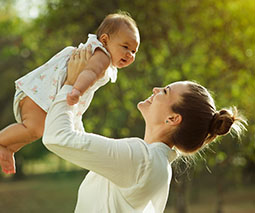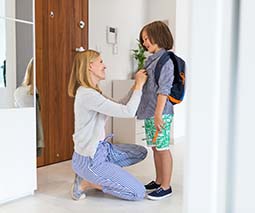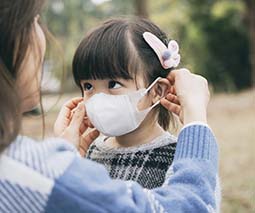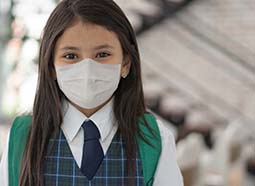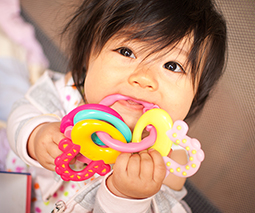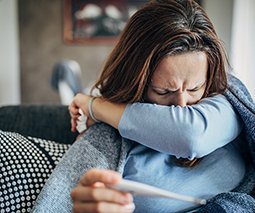There’s a measles outbreak in Australia right now – what you need to know
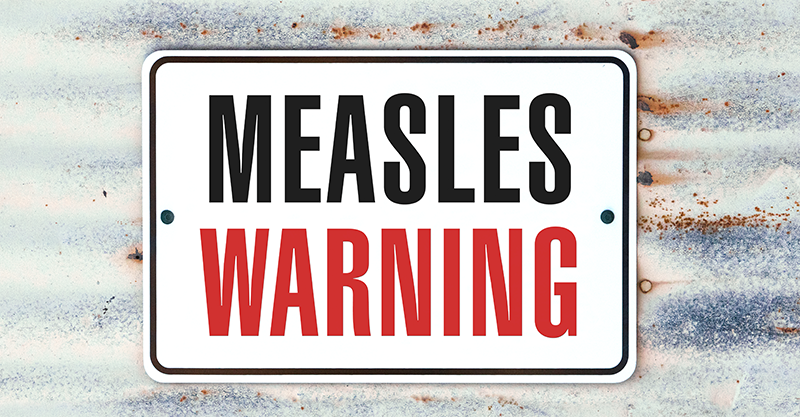
What do parents need to know about preventing measles in their family and stopping the spread of the disease in their community?
- Measles 101: A family guide to measles
- Why are we still doing studies about autism and the MMR vaccine?
- Why vaccine opponents think they know more than medical experts
How serious is the measles outbreak in Australia?
“Australia is on track for its worst measles rate in five years, with 84 confirmed cases so far in 2019,” The Sydney Morning Herald reported yesterday.
“All cases can be traced back to individuals who contracted the infection from overseas and travelled back to Australia, spending time in public places while they were unknowingly infectious.”
To give you an idea of how this measles outbreak is speedily taking hold this year, last year Australia only reported 103 cases for the entire year. In 2017 we had 81 reported cases.
WHO Western Pacific Regional Director Dr Takeshi Kasai told SBS News that measles spreads like wildfire.
“It is the most contagious human disease, and it’s very good at seeking out and spreading among even small groups of people who are not immune,” Dr Kasai said.
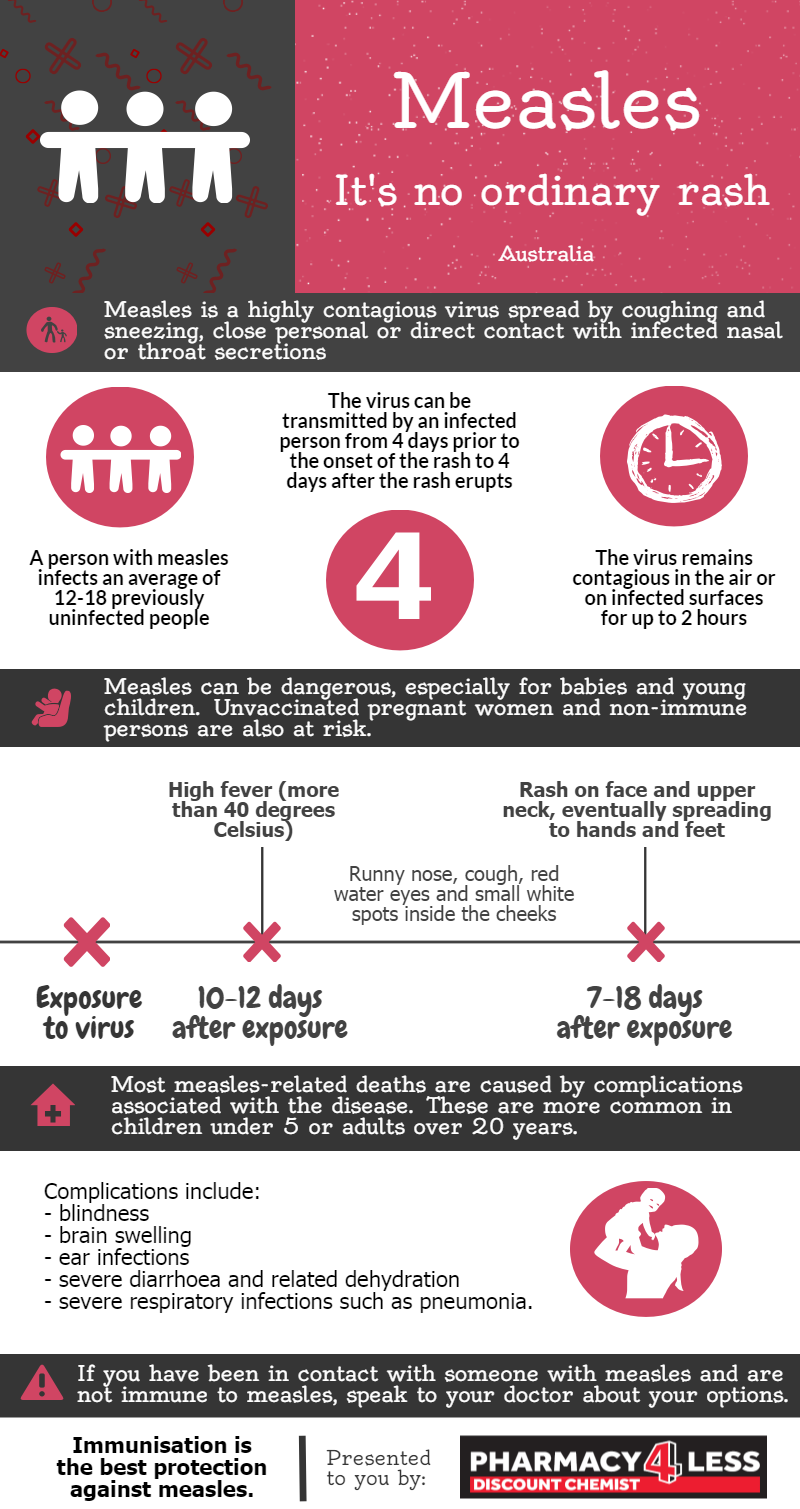
image source – Pharmacy 4 Less
What is causing the spread of measles?
Around the world “measles rates doubled last year and advanced economies are struggling to contain the disease,” the ABC tells us.
Unvaccinated people travelling into Australia after unknowingly contracting the disease is one cause of this outbreak. Those people expose others to measles before they realise they are infected.
‘Vaccination hesitancy’ – where parents are unsure about vaccinating their child or simply put it on the backburner – has also allowed measles to resurface in many countries after years of successful immunisation programs had almost eradicated it.
Social media campaigns by ‘anti-vaxxers’ have also contributed to this vaccination hesitancy, with a plethora of misinformation being shared widely. This has prompted new sanctions against anti-vaxxers by platforms like Facebook.
If you were born between 1966 and 1994 you might not be fully vaccinated against measles! You need 2 doses to be covered, so get a free vaccine from your GP. (It's safe to have another dose). Find out more: https://t.co/hWvUOLNFj0 pic.twitter.com/BBZFESWnqS
— NSW Health (@NSWHealth) April 3, 2019
Earlier this year the World Health Organisation declared this ‘vaccination hesitancy’ to be one of the world’s top health concerns. It’s been responsible for dangerous outbreaks of measles in Japan, New Zealand, the US, Canada, Europe and here in Australia, The Sydney Morning Herald explains.
In fact the US is currently experiencing its worst measles outbreak since 2014, with 465 cases reported so far this year, according to the US Centers for Disease Control and Prevention (CDC).
“With these measles outbreaks, we have a perfect storm of an incredibly contagious disease, pockets of unvaccinated people living in close proximity, and growing distrust of vaccines and public health initiatives in those communities,” Columbia University Medical Center’s Dr Melissa Stockwell told Newsweek.
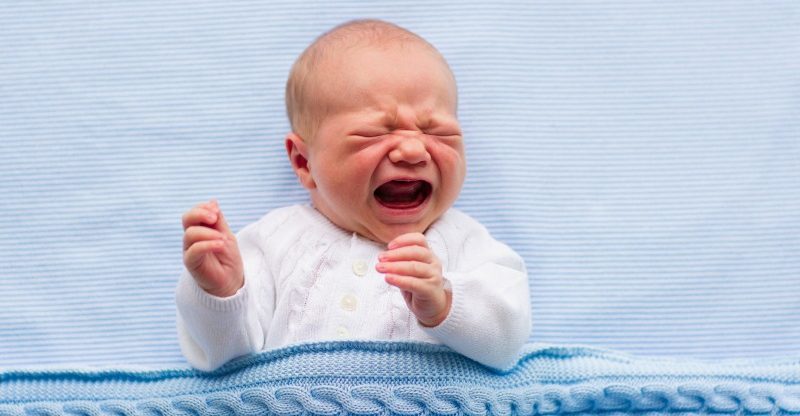
Why is measles dangerous?
Measles is highly contagious and can spread through the air via droplets from coughs or sneezes. The virus can live in the air for two hours and can be transmitted through contaminated surfaces.
Symptoms can include a cough, runny nose, red, watery eyes, a fever, spots inside their mouth and sometimes a rash.
According to the CDC, complications from measles can result in a number of life-long or catastrophic conditions.
- Ear infections occur in about one out of every ten children with measles and can result in permanent hearing loss.
- As many as one out of every 20 children with measles gets pneumonia, the most common cause of death from measles in young children.
- About one child out of every 1,000 who get measles will develop encephalitis (swelling of the brain) that can lead to convulsions and can leave the child deaf or with intellectual disability.
- For every 1,000 children who get measles, between one and two will die from it.
- Measles may cause a pregnant woman to give birth prematurely, or have a low-birth-weight baby.

Australians are at risk
While Australia’s measles immunisation coverage is high, with 93.5 percent of two-year-olds fully vaccinated, a 95 percent immunisation rate needed to achieve herd immunity, prevent the spread of measles and protect those with compromised immunity and those who can’t be vaccinated, such as infants under 12 months old.
“Immunisation saves lives,” Health Minister Greg Hunt told The Sydney Morning Herald. “The measles vaccine is very effective at protecting lives. Two doses of the vaccine are recommended for full protection. I urge all Australians to check their measles immunisation history – if you are not sure, talk to your doctor.”
How can your family help prevent measles?
NSW Health advises the following:
- The best protection against measles is immunisation with two doses of measles containing vaccine, given at least four weeks apart.
- In Australia, two doses of measles containing vaccine are offered to children under the National Immunisation Program (NIP). The first dose is scheduled at 12 months of age as the measles-mumps-rubella (MMR) vaccine. The second dose is scheduled at 18 months of age as the measles-mumps-rubella-varicella (MMRV) vaccine. These vaccines provide protection against mumps, German measles, and chicken pox as well as measles.
- People planning travel with children between nine and 18 months of age should discuss their travel plans with their GP, as the schedule can be adjusted for children travelling to areas with a high risk of measles.
- Anyone born during or after 1966 who has never had measles infection should see their doctor to make sure that they have had two doses of measles containing vaccine at least four weeks apart. If not the vaccine is free in NSW.
- It is safe to have the vaccine more than twice, so people who are unsure should be vaccinated.
- People with measles should stay at home until they are no longer infectious (i.e. until four days after the rash starts) to reduce the possibility of spreading it to other people.
Again, head to your doctor to discuss your family’s measles risk and help bump that rate up above 95 percent. You’ll be protecting your own family AND the most vulnerable Australians by doing so.
